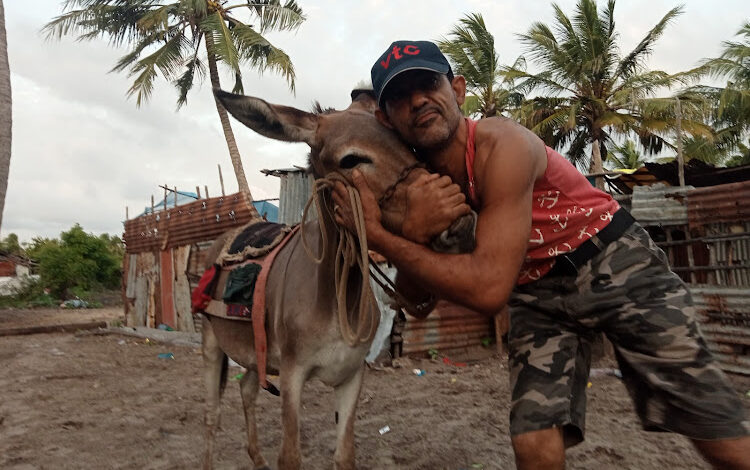
Faith Nyasuguta
Usually, a grade four pupil may fumble with simple addition mathematics. However, a donkey in Kenya’s coastal town of Lamu can comfortably and easily give you an answer, and a correct one at that.
All thanks to one Mohamed Abeid, 45, the only donkey whisperer that has ever lived on this side of Africa.
In the island and the nation at large, he is the only one that understands the language of donkeys in Lamu island. He can tell from afar what a donkey is thinking or saying just by looking at it and listening.
Weirdly, the donkeys,as well, have come to trust that a two-legged human being can actually speak like one of their own.
Immediately he speaks a command, the donkey dutifully responds, the same way humans understand each other.
Born in the Kenyan coast, Abeid notes that his skill is self-taught following his fascination with donkeys and his love for them, which started when he was just a young boy in primary school.
Today, his fame has spread far and wide, with dozens flocking the island just to witness for themselves how a man is capable of effectively communicating with donkeys and training them to do things we are used to seeing only humans do.
In his compound, one of his donkeys, 15-year-old Riziki, is dancing her way off to a local music tune by tapping her feet rhythmically as Abeid plays the song on his phone.
The father of five says he has been branded crazy just because of the close relationship he shares with donkeys.
“They actually say I use witchcraft but it’s all talent and passion. I trust only God but what I have with donkeys is special. No wonder they think only weird powers can achieve that,” Abeid says.
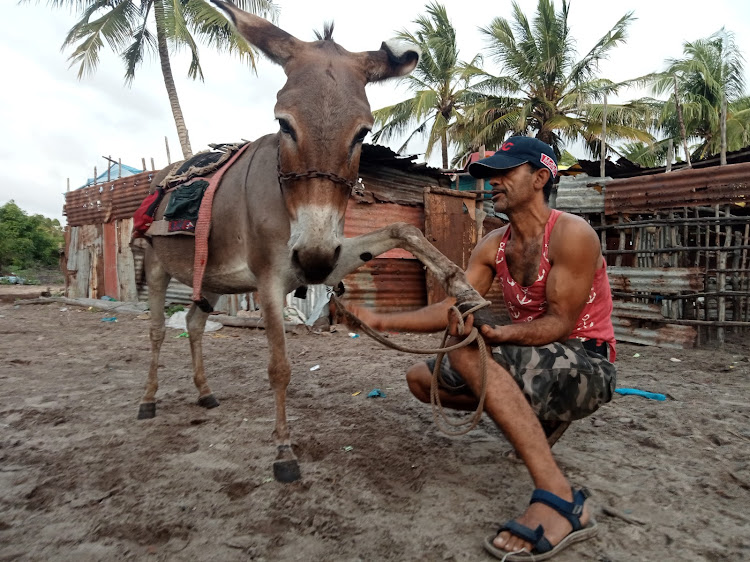
Among his many talents with donkeys, Abeid says he can gauge their health through consultation.
“By speaking to it and asking how it feels, I’m able to know what problem it has. If, for instance, it’s sick and I ask if it is okay, one tap on the ground means affirmative, while two taps mean it is not okay and it’s in pain,” he says.
“I’m able to tell if a donkey has a problem, for example, a headache or is in labour, they speak to me and we understand each other.”
He currently owns three donkeys, which he named Riziki, Rambo and Jullie.
DONKEY LESSONS
From the time they are born, Abeid begins training his donkeys to communicate and practically respond to commands as it’s normal for them to grasp easily at that tender age.
He also trains older donkeys, but it takes more time and effort compared to the younger ones.
“It calls for patience and lots of it. The babies are easy to teach compared to the older ones but when I’m focused on training a donkey, I don’t stop until the class is successful and the donkey can respond to all commands without a hitch,” he says.
Part of the classes he takes the donkeys through is basic greetings, whereby the donkey is taught how to respond to a greeting and how to greet, too.
“I start off with simple greetings like telling them ‘Hi’. They must be able to say ‘Hi’ back and I should be able to understand,” he says.
For instance, in response to being greeted ‘Hi’, the donkey lifts its right leg up at the knee just above the ground. That is a proper greeting.
In addition, the donkeys undergo basic manners training, like knocking on a door three times before entering or when they want the attention of anyone in the compound.
“My donkeys won’t barge into a house or any building without knocking unless, of course, I ask them not to,” he says.
Funny enough, Abeid explains that the classes also involve swimming, which he says apart from the fun bit of it, is also therapeutic to the donkey’s skin and general health.
What people find most amazing is the math class training, where the donkey is taught how to respond correctly to a math problem brought before them.
He demonstrates by asking the donkey to give the answer to the sum 2+3, to which the donkey Riziki responds by cleverly tapping his feet down five times to indicate five, which is the right answer to the question.

The math session also involves teaching the donkey how to count from number one to 20.
Abeid demonstrates by writing the number 10 on a wall, to which the donkey responds by tapping its feet on the ground 10 times to mean 10.
“During the training, sometimes they get confused counting, but after a few weeks of training, my donkeys will comfortably count any number you put before them,” Abeid says.
In a show of cleverness, the donkey responds with four taps after she is asked to count the visitors before him.
“She knows how many you are and that’s why she tapped four times when I asked her to tell me how many visitors there are,” he says.
Some other classes include reading, racing and dancing.
“Like now, I was teaching them how to dance to the latest bongo songs. The basic move is to listen to the tune and then move along with my legs as they copy. After some days, they are able to break into dance at the sound of any of their favourite songs just like you and me,” Abeid said.
Above all Abeid says his donkeys must all learn to pray just like Quran asks all Muslims to do.
Riziki and Rambo, for instance, are able to pray effectively: twice at sunrise, four times at noon, four times in the afternoon, three times at sunset and four times at night.
BEING AN EFFECTIVE WHISPERER
According to the renowned whisperer, all it takes to train a donkey ,make them listen and do what you want is just a little bit of TLC (Tender Loving Care).
He emphasises that all donkeys need is love, and that is enough for them to obey you for the rest of their lives.
“The opposite is equally true, that’s why you see a lot of unruly donkeys all over,” he says.
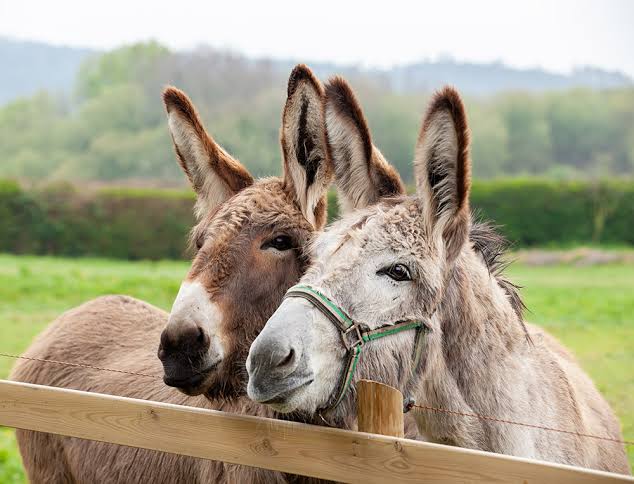
“People don’t love them yet they expect them to obey them. Donkeys are very stubborn if they discover you don’t care for them. It can be stressful.”
He reveals that a well-loved donkey is able to recognise the voice of its owner from miles away when called and will go straight to them.
He says the trick is in paying attention to the body language of the animal, seeing as donkeys can’t talk, so they communicate using their bodies and eye contact.
Abeid says though he was unlucky not to have gone to school. He believes the supernatural gift was placed in him for a reason.
“God doesn’t give you everything. I didn’t go to school but I have something many people only wish for,” he says.
“It’s special because even I myself can’t explain how it came to be. I just woke up and was able to understand donkeys and their language.”
He recalls training over 50 donkeys, but he only trains his donkeys as he believes involving outside donkeys will mean exposing his rare gift, which he intends to pass on to the younger generation at a time when he will no longer be able to whisper.
The key to donkey whispering, he says, is patience as they are known to be quite stubborn and distrustful.
“You can’t train it and beat it at the same time. It will never like you or whatever you are trying to teach it,” Abeid says.
“Donkeys are stubborn in nature but with some love, patience and understanding, you can turn them into the meekest, most clever animals.”
He explains that the trick is in having the animal embrace human learning and actions without losing itself as an animal, but still remain obedient while at it.
“It has to reach a point where it can take the commands without seeming like you are forcing it to do so,” he says.
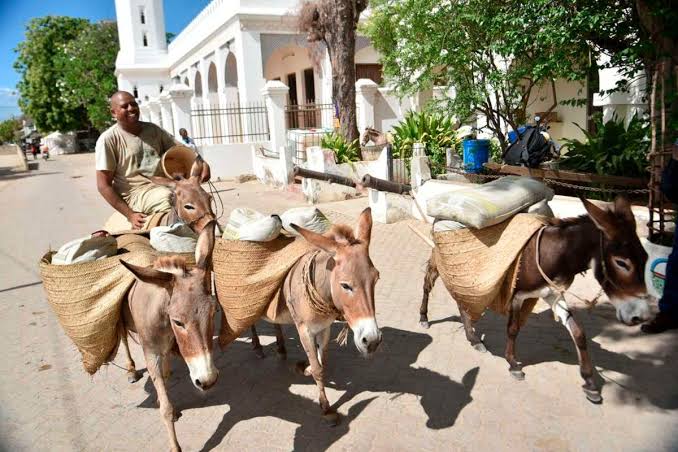
“The two of you must not look like you are in competition and the donkey must be able to remain calm through the toughest of tests.”
He says the trainer must be able to motivate a positive response to a command by appreciating the donkey either by patting, kissing or loudly telling them how proud you are of them.
“Words like ‘good boy’ and ‘very good’ are great motivators. They need reassurance that you are noticing their efforts,” he says.
Despite the hullaballoo that comes with whispering, Abeid says it has not changed his life much. But he hopes that in future, he will be able to make a fortune from it.
Though he is a donkey enthusiast, Abeid says he has chosen a different path for his children and wants them to go to school.
“I took my kids to school because I want them to have a better life. They love donkeys, too, but I told them not to make the same mistake I did by not going to school,” he says.
OBSTACLES
For the donkey whisperer, it has not always been rosy after it emerged that he has a special talent that others could only dream of.
In 2016, he came back home to find his favourite donkey California foaming from the mouth.
“I administered first aid and was able to revive it. Someone had poisoned its food,” he says.
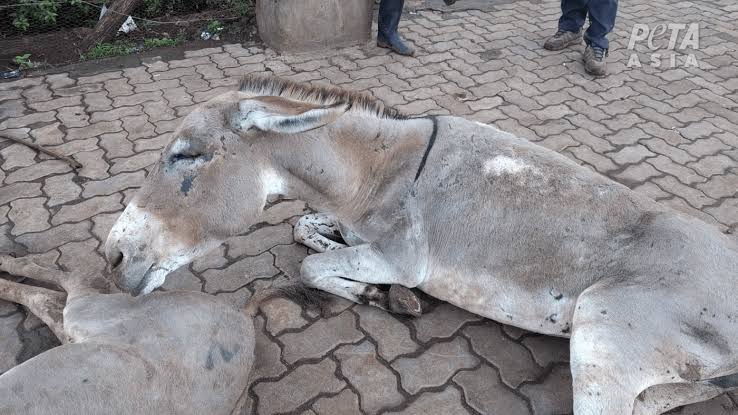
“It was among the best donkeys I ever owned and trained. We were so close. It felt like someone had poisoned me instead. But it recovered.”
However, five years later, the same donkey would be poisoned again for the second time, only that this time round, he lost it.
“They succeeded in killing because at the time it was making quite some waves. It was the first to ever grasp mathematics easily. I was broken but I made peace with it. Now I have these three.”
Abeid intends to pass on the whispering baton to the younger generation through a group of young people currently under his training.
“One of these kids will be the next donkey whisperer,” he says.
Abeid hopes the local and national governments will recognise his talent and appoint him to a position that will enable him to champion the rights of donkeys in his home region and also make a living for his family.




